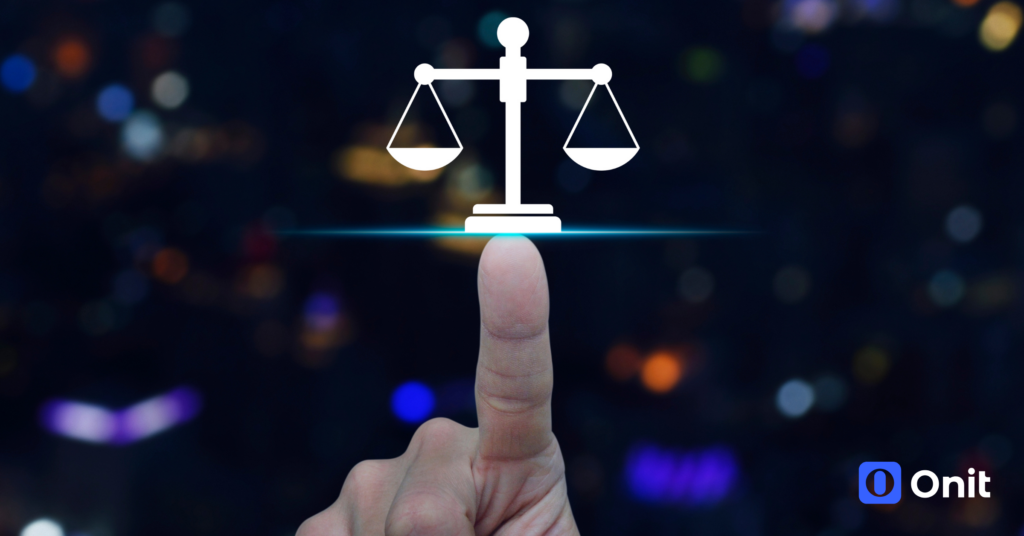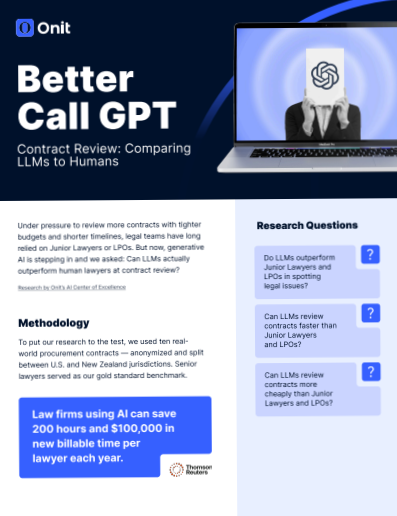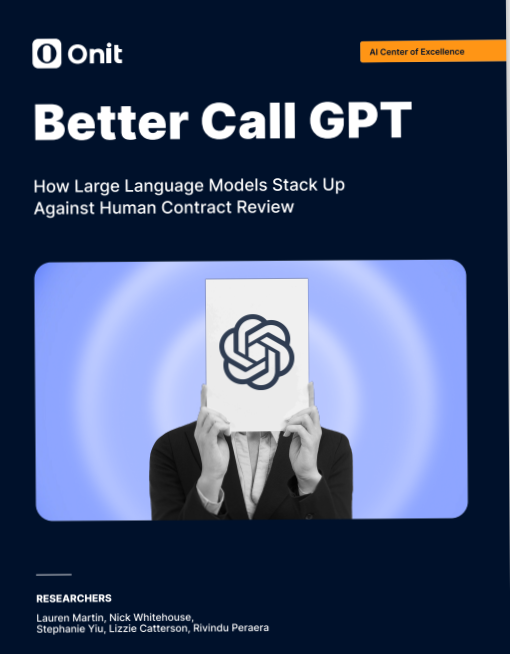Legal departments are under more pressure than ever to do more with less — more contracts, tighter budgets, shorter timelines. For years, contract review tasks were handed off to junior lawyers or sent to legal process outsourcing providers (LPOs). But today, AI contract review using Large Language Models (LLMs) is emerging as a game-changer.
At Onit’s AI Center of Excellence, we set out to answer a bold question: Can Large Language Models (LLMs) outperform human lawyers in reviewing legal contracts? The results aren’t just compelling — they signal a shift that’s already underway.
Here we outline major takeaways from the full research paper conducted by the AI Center of Excellence, available here.
AI Contract Review: LLMs vs. Lawyers – Who Wins?
What are LLMS?
An LLM, or Large Language Model, is an AI system trained on massive amounts of text data to understand, generate, and reason with human language.
To find out how LLMs stack up against Junior Lawyers and LPOs, we benchmarked performance on three fronts: accuracy, speed, and cost. We used real-world procurement contracts and measured every review against the gold standard — senior lawyers’ assessments.

Here’s what we found:
1. AI Isn’t Just Matching Humans — It’s Elevating Them
LLMs like GPT-4 are now performing contract reviews with a level of precision that rivals professional legal service providers — and in many cases, they’re outperforming junior lawyers.
They’re not just keeping up, they’re raising the bar. While seasoned professionals still have an edge in pinpointing where issues appear, AI is closing that gap fast and already exceeding the capabilities of many junior team members.
Takeaway: This isn’t about humans being replaced. It’s about giving legal teams the superpowers they need to move faster, think bigger, and focus on what matters most. When AI handles the tedious, humans can lead with insight, creativity, and strategy.
2. AI is 70x–270x Faster
Speed is where LLMs leave human reviewers in the dust. While a junior lawyer may take nearly an hour to review a contract, LLMs clock in at just a couple of minutes or less.
- Junior Lawyers: ~56 mins
- LPOs: 201 mins
- GPT-4 1106: 4.7 mins
- Claude 2.0: 1.63 mins
- Palm2: under 1 minute
Even with setup and prompt engineering time factored in (averaging about 16 hours), LLMs still provide massive long-term efficiency gains.
Takeaway: LLMs aren’t here to compete with humans — they’re here to boost our capacity. By offloading repetitive work, they help legal teams move faster, take on more, and focus on the strategic work that really matters.
3. AI is 99.97% Cheaper
Cost savings were just as dramatic. A junior lawyer averages around $74 per contract, while top LLMs do the same job for $0.02–$0.25.
| Reviewer | Avg. Cost Per Contract |
| Junior Lawyer | $74.26 |
| LPO | $36.85 |
| GPT-4 1106 | $0.25 |
| Claude 2.1 | $0.02 |
| Palm2 | $0.03 |
Takeaway: LLMs don’t just save time. They shift how we invest in human talent. Instead of spending hours on repetitive reviews, junior lawyers can focus on higher-value work that demands judgment, creativity, and critical thinking. It’s not about hiring less. It’s about empowering your team to do more meaningful work.

What This Means for Legal Teams
If you’re managing a high-volume legal workload — procurement, compliance, risk — you already know the pain points: too many documents, too few hands. LLMs are ready to fill that gap. They’re fast, cost-effective, and increasingly accurate.
In fact, our research findings suggest LLMs are already strong enough to disrupt the traditional LPO model. And while junior lawyers won’t be replaced anytime soon, we see their roles evolving — moving from routine tasks to higher-value, strategic work.
The Future of Legal Work is AI-Native: Are You Ready?
This research confirms what forward-thinking legal leaders already sense: the future of contract review isn’t just powered by AI — it’s AI-native. Success will belong to those who rethink processes from the ground up with AI at the core, not as an add-on.
This isn’t about replacing humans. AI is redefining how legal work gets done. Whether you’re exploring LLMs to speed up contract review or scale your legal operations, the opportunity is clear.
Early adopters will unlock efficiency, reduce costs, and gain a competitive edge. Those who wait? Risk being left behind.

Just Getting Started? Download our Better Call GPT one pager for a quick snapshot of the research — perfect for sharing or bringing to your next team sync.
Ready to Go Deeper? Unlock the full research insights, benchmarks, and legal impact analysis in our comprehensive whitepaper — available for download.





